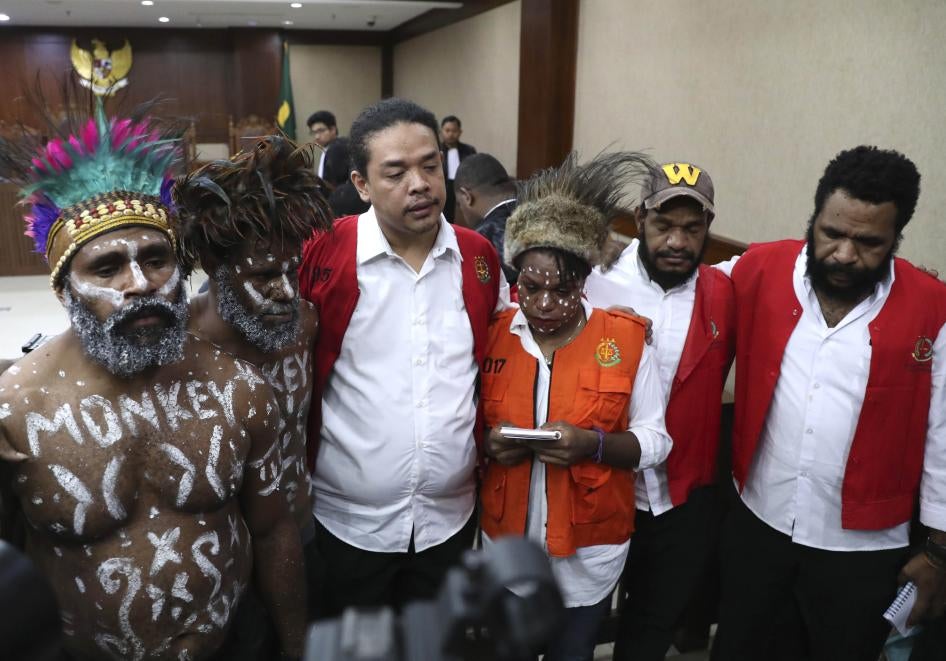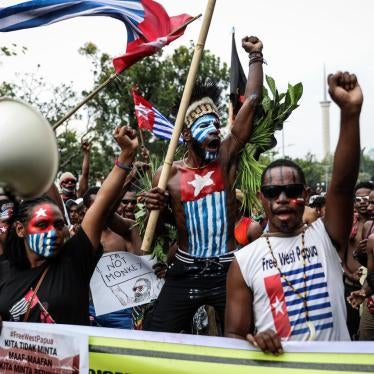(Jakarta) – The Indonesian government should immediately release at least 70 Papuan and Moluccan activists imprisoned for peacefully voicing their political views, Human Rights Watch said today. The government should adopt measures to ensure that police and prosecutors, especially in the eastern provinces, protect free expression rights in accordance with a 2018 constitutional court ruling.
From April 25 to 27, 2020, the police in Maluku arrested 23 activists, including at least two children, who allegedly participated in flag-raising ceremonies commemorating the 70th anniversary of the declaration of independence of the Republic of South Moluccas (Republik Maluku Selatan, RMS) in 1950. The police indicated that seven of the activists will be charged with treason under article 106 of the criminal code, which carries a maximum sentence of life in prison.
“Detaining and prosecuting Papuan and Moluccan activists for peacefully voicing their political views backtracks on the government’s commitments to free expression,” said Andreas Harsono, senior Indonesia researcher at Human Rights Watch. “These activists should never have been imprisoned, and detaining them in the midst of the Covid-19 pandemic could be deadly.”
On April 25, three activists walked openly into the Moluccan police headquarters in Ambon, the capital of Maluku province, carrying the RMS flag. They shouted “Mena muria,” a popular salute among Moluccan people, traditionally used among boat rowers that means, “You go, I follow.” Police arrested the three men – Johanes Pattiasina, Simon Viktor Taihutu, and Abner Litamahuputty – as well as four other activists who unfurled the flags in some other towns.
On April 24, a court in Jakarta, Indonesia’s capital, convicted six Papuan activists for treason and sentenced them to between eight and nine months in prison. The five men and one woman were involved in a rally on August 28, 2019, outside the State Palace in Jakarta, during which they unfurled the Morning Star flag, a symbol of Papuan independence. The rally, involving more than 500 people, was held to protest racist attacks by the police against Papuan students in Surabaya, Java Island, on August 17.
The six activists are among 63 political prisoners in prison for peacefully expressing their political beliefs. On April 15, 2020, their lawyers submitted information on their cases to the United Nations Working Group on Arbitrary Detention.
Human Rights Watch, along with Amnesty International, Kontras, and other human rights groups, have for more than a decade pressed the Indonesian government to release political prisoners.
In May 2015, President Joko “Jokowi” Widodo pardoned and released five Papuan prisoners from Abepura prison, Jayapura. He publicly promised to release all Moluccan and Papuan prisoners, and said he wanted “to stop the stigma of conflict in Papua and to create a sense of peace.” His administration gradually released nearly 100 political prisoners, mostly by reducing sentences.
In January 2018, Indonesia’s Constitutional Court rejected a judicial review to annul the criminal code’s six treason articles, including article 106, but found that those articles were often disproportionally applied against political activists raising the Morning Star flag in Papua and the RMS flag in the Moluccas Islands.
President Jokowi should drop all charges for peaceful political expression, order the release of all political prisoners, and review the failure of law enforcement officers, especially in the Moluccas Islands and Papua and West Papua provinces, to follow the Constitutional Court ruling, Human Rights Watch said.
Concerned governments, including the United States, European Union member countries, and Australia, should raise the situation of Indonesia’s political prisoners in bilateral meetings. The Polish government should raise concerns about the treatment of Jakub Skrzypski, a Polish national who was arrested in West Papua and sentenced in May 2019 to five years in prison under article 106.
Human Rights Watch takes no position on claims to self-determination in Indonesia or in any other country. Consistent with international law, however, Human Rights Watch supports the right of all individuals, including independence supporters, to express their political views peacefully without fear of arrest or other forms of reprisal.
“President Jokowi succeeded in releasing many political prisoners in his first five years in office,” Harsono said. “Jokowi’s second term should not produce as many political prisoners as his predecessor. These cases are a bitter betrayal of his government’s prior policy and contrary to a top court ruling.”








